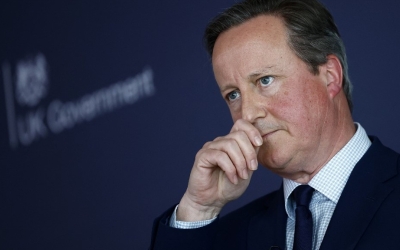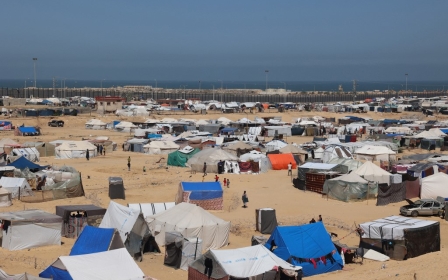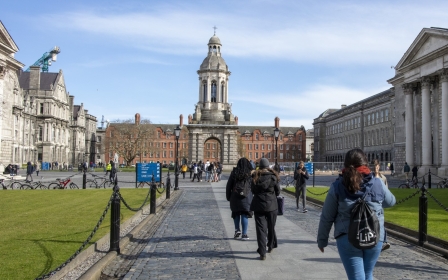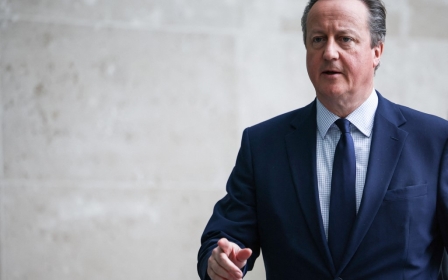Cambridge's wealthiest college votes to divest from arms companies

The college council of the University of Cambridge's wealthiest constituent college, Trinity College Cambridge, has voted to divest from all arms companies, Middle East Eye can reveal.
MEE learnt from three well-informed sources close to Trinity's student union that the college council, responsible for major financial and other decisions, voted to remove Trinity's investments from arms companies in early March.
According to the sources, the college decided not to announce that it would divest from arms companies after an activist defaced a 1914 portrait of Lord Arthur Balfour - who authored the infamous Balfour Declaration - inside the college on 8 March.
The incident prompted widespread media coverage in the UK - and condemnation from British MPs, including Deputy Prime Minister Oliver Dowden.
According to the official minutes of Trinity College Student Union's meeting on Saturday 11 May, the student union committee's president said that the body had met with students and the college about Trinity's investments in Israeli arms companies.
"The latest update is that Trinity will be and is in the process of divesting; however, the college will not be making a public statement on the matter," the president was recorded as saying:
"This is because the college does not want to be seen to reward the slashing (last term) of the painting of Arthur Balfour", and noted that the student union had been told the college will have divested from all arms companies "by the summer".
Another member of the student union committee added: "We have been told the college council voted to divest."
Trinity is administered by the college council.
Trinity College Cambridge did not confirm or deny that the vote took place, but told MEE that: "Trinity College continues to review its investments regularly."
MEE revealed in February that Trinity had £61,735 ($78,089) invested in Israel's largest arms company, Elbit Systems, which produces 85 percent of the drones and land-based equipment used by the Israeli army.
MEE also reported that the college had millions of dollars invested in other companies arming, supporting and profiting from Israel's war on Gaza.
In response to the report, the International Centre of Justice for Palestinians (ICJP), a UK-based rights group, issued a legal notice to Trinity College on 28 February warning that its investments could make it potentially complicit in Israeli war crimes.
The ICJP issued Trinity a follow-up warning on 30 April, but still received no response from the college. On 7 May, the rights group submitted a formal complaint to the Charity Commission requesting an investigation into Trinity’s investments.
MEE revealed in February that the college also had investments worth approximately $3.2m in Caterpillar, a US-based heavy equipment company that has long been the target of boycott campaigns for its sale of bulldozers to the Israeli army, and multiple other companies involved in Israel's war - including General Electric, Toyota Corporation, Rolls-Royce, Barclays Bank and L3Harris Industries.
Trinity has not committed on divesting from all these companies.
ICJP Legal Officer Mira Naseer issued a statement in response to the latest news:
"This is an important win for the movement. Students across the world have campaigned tirelessly to urge their universities to divest from arms companies potentially complicit in Israel’s genocide, and now we are starting to see results. The fact that Trinity is Cambridge’s wealthiest college is a real symbolic victory and other colleges and universities must now follow suit.
"But it’s important to remember that companies that Trinity invests in are not only potentially complicit in Israel’s latest assault on Gaza, but also have a track record of providing equipment that has been used in home demolitions, the illegal Israeli separation wall in the West Bank and around Jerusalem, and other tools of apartheid. It’s good to see that Trinity has divested from arms companies, but it’s only the first step."
On Thursday, an open letter written by Cambridge academics and signed by more than 1,700 staff, alumni, and students from the university was published, expressing support for protesters who set up a protest encampment last week that calls on the university to end any potential complicity in Israel's war on Gaza.
Around a hundred students gathered on the lawn outside Cambridge's King's College on Monday, where they erected tents and demanded the institution commit to divesting from companies involved in Israel's war.
They joined students at over 100 universities worldwide who have set up similar protest movements.
The encampment's organisers told MEE they are demanding that Cambridge University disclose all its relationships with companies and institutions "complicit in the ongoing ethnic cleansing of Palestine".
On Thursday, UK Prime Minister Rishi Sunak summoned the vice-chancellors of 17 universities to an "antisemitism roundtable" at Downing Street and urged them to take "personal responsibility" for protecting Jewish students.
That same day, Trinity College Dublin, Ireland's most prestigious university, announced it would divest from Israeli companies involved in the occupation of Palestine after a sit-in by students protesting against the war on Gaza.
Since the events of 7 October, when a Hamas-led attack on southern Israel killed 1,171 people and resulted in more than 200 being taken back to Gaza as captives, the enclave has been under total siege and deprived of basic necessities, while facing a devastating bombing campaign by Israel.
More than 35,000 Palestinians have been killed and around 1.7 million displaced, in what was described at the International Court of Justice in January as a plausible genocide.
Nearly 77,000 people have also been wounded, according to health officials. The figures exclude tens of thousands of dead who are believed to be buried in the bombed-out ruins of homes, shops, shelters and other buildings.
This article is available in French on Middle East Eye French edition.
Middle East Eye propose une couverture et une analyse indépendantes et incomparables du Moyen-Orient, de l’Afrique du Nord et d’autres régions du monde. Pour en savoir plus sur la reprise de ce contenu et les frais qui s’appliquent, veuillez remplir ce formulaire [en anglais]. Pour en savoir plus sur MEE, cliquez ici [en anglais].





